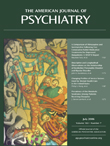To the Editor: We support the call by Glen O. Gabbard, M.D., and Robert Freedman, M.D., for more rigorous trials of psychotherapy
(1) . However, we wish to call attention to an important, underappreciated bias in trials that investigate both psychotherapy and pharmacotherapy. Allocation concealment is inherently easier for the medication treatment arms (through pill placebos) than the psychotherapy treatment arms, which may result in favorable response rates for psychotherapy compared to pharmacotherapy.
While the challenge of blinding in psychotherapy trials has been long recognized, we wish to point out that the problem intensifies in trials using both psychotherapy and medication arms. This is because some participants are more thoroughly blinded than others. In essence, two trials exist within one: a psychotherapy trial, which is often somewhat of an open-label “effectiveness”-type trial, and a medication trial, which is a double-blind “efficacy”-type trial. Thus, psychotherapy response rates may be inflated due to greater participant knowledge of their treatment assignment and their expectations. Because many of us are conditioned by randomized medication trials to expect that all arms are similarly blinded, it is easy to overlook this potential bias.
Two recent obsessive-compulsive disorder trials are illustrative. Foa and colleagues
(2) found that their exposure and ritual prevention produced better rates of “excellent” responses, when compared to clomipramine, and more respondents completing the trial. However, there was a crucial difference between the psychotherapy and medication arms: participants were not blinded to psychotherapy assignment—although raters and researchers were—while participants, as well as raters and researchers, were blind to medication assignment. Nakatani and colleagues
(3) deserve praise for including a placebo psychotherapy arm (relaxation training) in their study of behavioral therapy versus fluvoxamine. However, in light of the highly positive response in the behavioral therapy arm, the authors could have considered administering a measure, such as a “guess test,” to estimate whether participants could discern if their assignment was to active psychotherapy treatment. A similar approach could have been undertaken in the study by Foa and colleagues to determine whether raters remained blinded effectively.
Because of the intrinsic difficulties in blinding psychotherapy interventions compared to medication interventions, we suggest that trials involving psychotherapy and medication arms could make some attempt to estimate how effectively blinding is maintained. It would also be beneficial if, in the reports of such trials, language could be included indicating that allocation concealment is likely to be more difficult in some treatment arms than in others, which might influence response rates.

